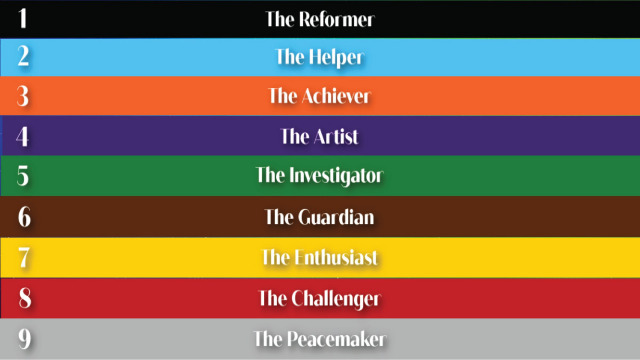Editor’s note: Mental health and wellbeing is sometimes overlooked in Christian circles, being aware of it through is vital to ministry. God has created us unique, with different strengths and weaknesses. Being aware of the different personality traits can help us share the gospel with others more effectively.
By Chris Morris — “Point out anything in me that offends you.” These heartfelt words from David suggest his recognition of a common challenge among humans–the lack of self-awareness. Though we are in our own skin 24 hours a day, seven days a week, it does not mean we are fully and consistently mindful of our shortcomings (or our strengths, for that matter). If we are honest, we have various areas of our personality and/or character that are blind spots to us.
The Enneagram* is a personality typing tool that describes nine different personality types. Unlike most other personality typing systems, the Enneagram focuses on inner motivations more so than external behaviors. Thus, the Enneagram can be used to facilitate a journey to greater self-awareness.
Greater self-awareness enables us to embark upon a more thorough surrender of our hearts to the Spirit.
If you discover you are a Reformer, or Type 1, you are driven by the need to be right, to be good, to show integrity, to be fair. When living in the flesh, you may unhealthily pursue perfection in your life. When living by the Spirit, you trade living for your perfection for living from Christ’s perfection.
If you find that you are a Helper, or Type 2, your inner motivations include being loved, being appreciated, and being needed. When living in the flesh, you may pursue acceptance in an unhealthy manner. When living by the Spirit, you stop living for your acceptance and start living from Christ’s acceptance.
If you realize you are an Achiever, or Type 3, you are driven by the need to be admired, to be valued, and to be successful. When living in the flesh, you pursue success at almost all costs. When living by the Spirit, you trade living for your success for living from Christ’s success.
If you identify as an Individualist or Type 4, your inner motivations include being authentic, being unique, and being expressive in your own way. When living in the flesh, you are obsessed with determining your significance. When living by the Spirit, you stop living for your significance and start living from Christ’s significance.
If you learn that you are an Investigator, or Type 5, you are driven by the need to be competent, to be capable, and to be self-sufficient. When living in the flesh, you tend to trust your own wisdom. When living by the Spirit, you live, not for your wisdom, but from Christ’s wisdom.
If you find that you are a Guardian, or Type 6, then your inner motivations include the need to be certain, to be safe, and to be supported. When living in the flesh, you can fixate on your security. When living in the Spirit, you live not for your security, but from Christ’s security.
If it is revealed that you are an Enthusiast, or Type 7, then you are driven by a need to be happy, to be content, and to be unrestrained. When living in the flesh, you search for joy in various sources. When living by the Spirit, you do not live for your joy, but from Christ’s joy.
If you discover that you are a Challenger or Type 8, then your inner motivations include being strong, being independent, and being protected. When living in the flesh, you tend to live from your strength. When living by the Spirit, you learn to live from Christ’s strength.
Finally, if you find that you are a Peacemaker, or Type 9, then you are driven by a need for harmony, a need to be at peace, and a need to be comfortable. When living in the flesh, you can avoid conflict in order to find peace. When living by the Spirit, you do not live for your peace but from Christ’s peace.
Paul says in Romans 8:12-13, “So then, brothers and sisters, we are not obligated to the flesh to live according to the flesh, because if you live according to the flesh, you are going to die. But if by the Spirit you put to death the deeds of the body, you will live”.
The Enneagram is not the gospel. Christ’s life, death, and resurrection applied to our lives through the Holy Spirit is the true gospel. But the Enneagram can go a long way in increasing your self-awareness, enhancing your experience of surrender to Christ, fully moving from life in the flesh to life in the Spirit.
–Chris Morris is the associate pastor at Littleton Adventist Church; email him at [email protected]; feature photo by pixabay, bottom photo supplied.
* The Enneagram according to Wikipedia is “The Enneagram of Personality, or simply the Enneagram (from the Greek words ἐννέα [ennéa, meaning “nine”] and γράμμα [grámma, meaning something “written” or “drawn”), is a model of the human psyche which is principally understood and taught as a typology of nine interconnected personality types. A free Enneagram test can be taken at https://www.gospelenneagram.com/ to discover your Enneagram type.




